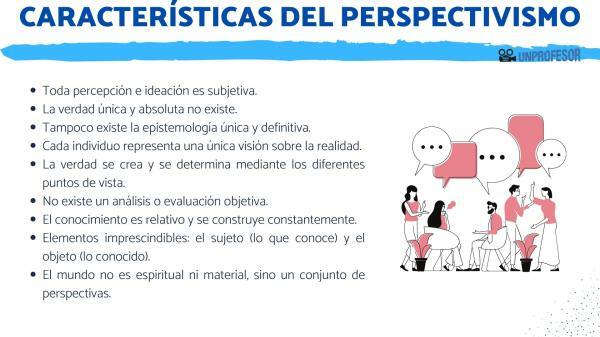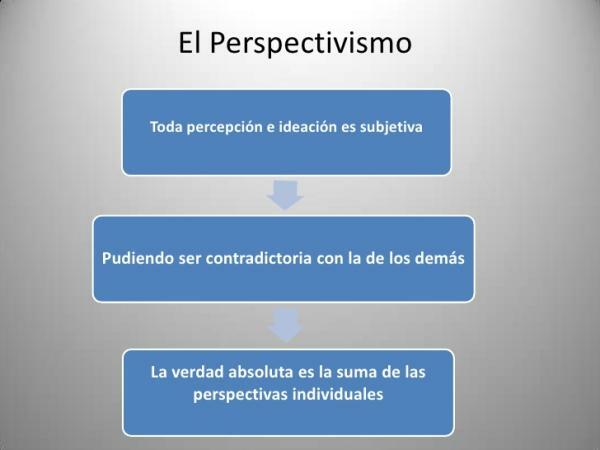13 characteristics of PERSPECTIVISM in philosophy

Welcome to a TEACHER! In today's lesson we are going to study the characteristics of perspectivism. A philosophical current that developed between the XIX-XX centuries, and according to which, the knowledge of any reality can be obtained through different perspectives or points of view (cognitive), because each of the perspectives is indispensable for the whole.
In this way, perspectivism directly collides with other currents (skepticism, dogmatism, objectivism, relativism, criticism) and tries to overcome them. Having as main representatives great philosophers such as Gottifried Leibniz (1646-1716), Gustav Teichmüler (1832-1888), Friedrich Nietzsche (1844-1923) or José Ortega y Gasset (1883-1955). If you want to know more about perspectivism, pay attention and keep reading this article.
Before we dive into the characteristics of perspectivism, let's find out what exactly it is. Perspectivism was born and developed as a philosophical current between the XIX-XX centuries with authors such as
Gustav Teichmüler (1832-1888), Friedrich Nietzsche(1844-1923),José Ortega y Gasset(1883-1955) or Jon Moline, However, his original approach starts from Gottifried Leibniz (1646-1716) by establishing that a monad(last element that forms the universe) is a perspective of the universe.“The same city, seen from different sides, seems completely different and is multiplying itself (…) there are different universes that, nevertheless, are different perspectives of only one, according to the points of view of each monad”(Leibniz)
In this way, perspectivism ends up establishing itself as the current that establishes that each human being knows reality from his point of view and that the world has multiple interpretations.
Most important perspectivism ideas
Likewise, it is sustained under three big main ideas:
- Every human being knows reality according to his point of view and all knowledge is subject to that point of view or perspective.
- The truth exists, but we cannot get to know it if we do not make a sum of all the perspectives, that is, if we want to know the true truth of a question we must know the different versions of said question.
- In one perspective, several perspectives can come together, that is, different points of view of different people. Therefore, each perspective is valuable (we are unique beings) and the only false perspective is the one that tries to be unique.

Once the characteristics of perspectivism are known, we are going to discover the most prominent representatives of this philosophical current. They are as follows.
Gottifried Leibniz (1646-1716)
On the one hand, he states that a monad (ultimate elements of the universe) is a perspective of the universe. And, on the other hand, with its theory of knowledge affirms that the individual approaches the world from his own interpretation of it and that there are different ways of accessing knowledge, which, at the same time, are ways true, contingent and different. Thus, he defines these ways of accessing knowledge as perspective or points of view that should be respected, as long as they have a logical-formal coherence.
Gustav Teichmüler (1832-1888)
In his work Dei wirkliche und die scheinbare Welt (1882) establishes that there are different ways of accessing the knowledge of a reality and that the justification leading us to each of those forms must be taken into account.
Friedrich Nietzsche (1844-1923):
This German philosopher establishes that the interpretation of the world is developed by the perception of each one (from a place and specific moment), that knowledge and the world can be approached from different points of view, all of them valid and justified. Being the perspective of each subject, only Y multiple / subjective points of view, which leads us to a better understanding and more interpretative possibilities on a question.
“Every representation of the world is a representation that becomes a subject; the idea that we can dispense with the vital situation of the subject, his physical, psychological, historical or biographical characteristics, to reach a knowledge of the world as it can be "
José Ortega y Gasset (1883-1955)
He is the main representative of perspectivism (2nd philosophical stage) and affirms that laperspectiva is a component of reality. Idea that is directly related to what he defines as circumstance: everything that is part of our world, but that we have not chosen (year of birth, parents, sex, language, hair color ...).
"I am me and my circumstance, and if I don't save her, I won't save myself"
On the other hand, he also defends that the truth is not absolute, objective, unique and timeless (rationalism), but we can only know the truth from our particular perspective that is subjective, individual, temporary and a sum of perspectives that complement each other.
Jon moline
In the 70s, Jon Moline, establishes that the fact of developing and adopting a specific point of view is directly related to experiences, that this could be individual and collective (I can have my point of view on something and coincide with that of a collective such as an association), which is directly related to the personality and role of each person and that it can manifest itself or appear in two different ways: a point of view developed by one person or trying to understand another person's point of view.
Throughout history, different philosophical currents and conceptions such as skepticism, dogmatism, criticism, objectivism or relativism, have tried to answer three of the most debated questions: What is knowledge? What is reality? What is truth?
However, all of them have collided with each other and with perspectivism, which emerged with the aim of overcoming these currents. In this way, they all disagree on the following ideas.
- Skepticism: It states that we cannot know anything about the world around us.
- Dogmatism: It affirms that the human mind does have the ability to know the truth.
- Criticism(from Kant): He tries to reach a middle ground and tells us that knowledge is reliable, since we cannot affirm that we have a full knowledge of reality, but neither can we say that we have absolute ignorance.
- Relativism: It affirms the non-existence of an absolute truth, any conception of the human being about knowledge is its own, everything is relative.
- Perspectivism: It establishes that each human being knows reality from his point of view.

